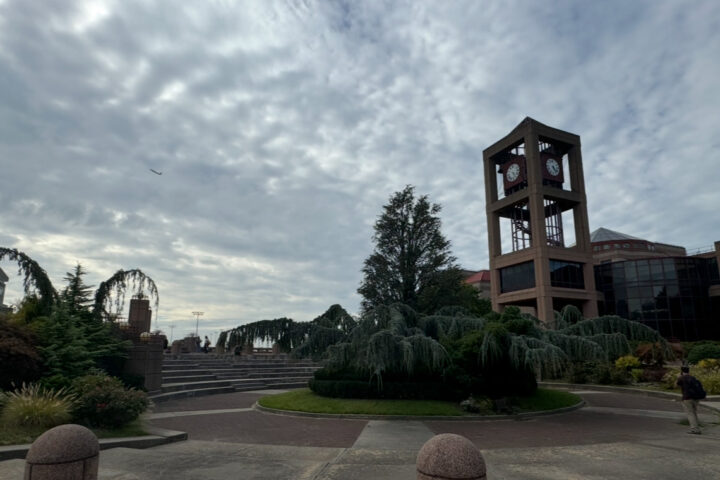The Theatre Department’s production of Gloria opened earlier this month at the Goldstein Theatre. Over the course of its 8-day engagement, the show threw the dangers of social isolation and tragedy commodification into stark relief. Visceral performances abounded and the painstakingly curated set forced the unreality of traumatic events to become real, if even for only one night at a time.
The show, for all its emphasis on themes of recursion and accountability, smacks of a more macabre Groundhog Day. Of course, to call it that would be a facetious reduction, as the nuance within the story amounts to so much more. Dean (Giovanni DeLeo), Kendra (Grace Hwang) and Ani (Rebecca Rivera) are cubicle-mates, and Miles (Michael Rigaud) is a baby-faced intern at a floundering magazine company grappling with the mundanities of their jobs and the seeming indifference of their boss, Nan (Michelle Osojnak). Just when it seems things couldn’t get any duller, a fatal workplace tragedy causes the survivors to reckon with their deep-seated traumas and re-evaluate their life choices. Dean, Kendra, and fellow ex-employee Lorin (Paul DiFilippo) are variously confronted with the demons of their past and interlopers who want to turn the survivors’ emotional loss into their financial gain.
Giovanni DeLeo shone as Dean. His snark provided brief vignettes of levity to an otherwise funereal production. Rebecca Rivera’s Ani served as his perfect foil in her intolerance of his wry humor and her demeanor of inexperience in the workplace. Michelle Osojnak, who in Theatre Guild productions of late has revealed a penchant for pregnant pauses, employed these and other subtleties to arresting effect in her dual performance as Gloria and Nan. Michael Rigaud’s versatility in playing roles as varied as maverick intern Miles and no-nonsense barista Shawn is undeniable, as is Paul DeFilippo’s capacity for naked vulnerability as the feeble yet unresigned Lorin.
Of particular note for her performance in the play was Grace Hwang as Kendra. After an illustrious body of work in QC’s operatic performances, Gloria was Hwang’s maiden foray into straight theatre. Watching her perform, one would never know. She pulled off both the fiery, indignant Kendra of Act 1 and the jaded, reclusive Kendra of Act 2 with equal aplomb.
Director Claudia Feldstein has demonstrated a high theatrical intelligence quotient in her staging of the play. Very few unnecessary liberties were taken with the content of the script, if at all. Ms. Feldstein has evidently taken to heart Claude Debussy’s axiom of music being the silence between the notes, as silence pervades the play’s action at every turn. It was seldom that a cacophony was produced, and when there was, it was given all the more gravitas for its prominence among a silence made deafening by the unsettling intimacy between performer and observer. Both shared a place on the stage; the seating was mere feet from the action. Although I had previously read the script of Gloria and thusly expected to remain relatively unfazed, I found myself hanging on every word out of the actors’ mouths.
The play’s events take place against very static backdrops, with only 3 scenes against 2 acts, which draws the eyes of the theatregoer to the action. Not, of course, that the set doesn’t deserve its fair share of praise. Harry Feiner, as the set designer, has done more than his due diligence in invoking the clashing themes of monotony and chaos that govern the first and second acts, respectively, and define the tonal shift that occurs in between. His first-act office is drab and unassuming (as it should be), while the design he gives to the second-act Starbucks reveals a scrupulous attention to detail and, perhaps, suggests the new appreciation the play’s survivors have for those same reassuring constants of life they took for granted before the tragedy.
Tasked with bringing a Pulitzer Prize finalist script to life, the Theater Department has delivered in spades. They have navigated the web of complicated topical issues discussed therein with great tact, and the finished product reflects the TLC that those involved put in. I can say with the utmost confidence that Gloria, of the three Theatre Department productions I’ve seen, is my favorite. I eagerly anticipate their future endeavors – with all condolences to fans of Sarah Tweed.











